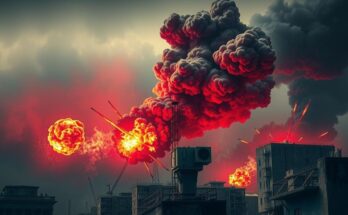Iran’s Supreme Leader Ayatollah Ali Khamenei condemned U.S. airstrikes on Yemen, calling them a “crime that must be stopped.” His remarks highlight growing regional tensions related to ongoing conflicts involving Israel and the Houthi militia. The situation reflects a broader struggle involving U.S. allied forces and Iranian proxies, with significant implications for Middle Eastern stability.
Ayatollah Ali Khamenei, Iran’s Supreme Leader, has strongly condemned the recent U.S. military strikes on Yemen, labeling these actions as a “crime that must be stopped.” In a video statement released recently, Khamenei warned against attacks on the Houthi militia and emphasized the need to prevent further military engagement. This reaction comes amid increasing regional tensions due to renewed Israeli airstrikes on Gaza and Houthi threats aimed at shipping related to Israel.
The conflict in Yemen is emblematic of the broader confrontation between U.S.-aligned forces and Iran’s regional affiliates. The recent strikes by the U.S. not only targeted the Houthi leadership but also threatened to escalate conflicts across the Middle East. Khamenei’s remarks reflect ongoing Iranian support for the Houthis while simultaneously denouncing U.S. military involvement in the area.
In his statement, Khamenei accused the U.S. of actively facilitating Israeli airstrikes on Gaza, asserting that these actions occurred with “U.S. permission, or support and green light.” In conjunction with celebrations marking the Persian New Year, he called upon “freedom-seekers around the world” to unite against Israel. Concurrently, Iran’s foreign ministry condemned the U.S. strikes, categorizing them as “war crimes” in tandem with Israel’s military operations in Gaza.
Following the strikes, the U.S. acknowledged that several high-ranking Houthi officials were targeted and killed. In contrast, the Houthi-run health ministry stated that the assault resulted in at least 53 fatalities and numerous injuries. This intervention marked the first instance of U.S. military action in Yemen since the inauguration of former President Donald Trump.
The Houthis, aligned with Iran’s “axis of resistance” against the U.S. and Israel, have promised to renew their assaults on vessels linked to Israel in retaliation for the blockade of aid to Gaza. Following the commencement of the Gaza conflict on October 7, 2023, the Houthis had previously interrupted shipping routes in the Red Sea, pausing their operations during a temporary ceasefire earlier this year.
As Israeli airstrikes intensify in Gaza, the humanitarian situation continues to deteriorate. Khamenei has decried these strikes as a “catastrophic crime,” attributing significant responsibility for these actions to Washington’s support of Israel.
Prominent individuals have publicly commented on the situation. Khamenei stated, “This attack on the people of Yemen, on Yemeni civilians, is a crime that must be stopped,” while former President Donald Trump remarked, “Tremendous damage has been inflicted upon the Houthi barbarians, and watch how it will get progressively worse.”
As tensions heighten, the U.S. is likely to persist in targeting Houthi military assets. The renewed threats posed by the Houthis regarding Red Sea trade routes may prompt additional military actions, increasing the likelihood of broader regional conflict.
In summary, Ayatollah Ali Khamenei’s condemnation of U.S. airstrikes on Yemen reflects deepening regional tensions. The conflict exemplifies the ongoing rivalry between U.S. forces and Iran’s proxies, particularly the Houthis. Khamenei’s rhetoric underscores Iran’s support for the Houthis while criticizing U.S. involvement. The situation continues to evolve, with implications for both humanitarian conditions in Gaza and the potential for escalated military engagement in the region.
Original Source: www.newsweek.com




